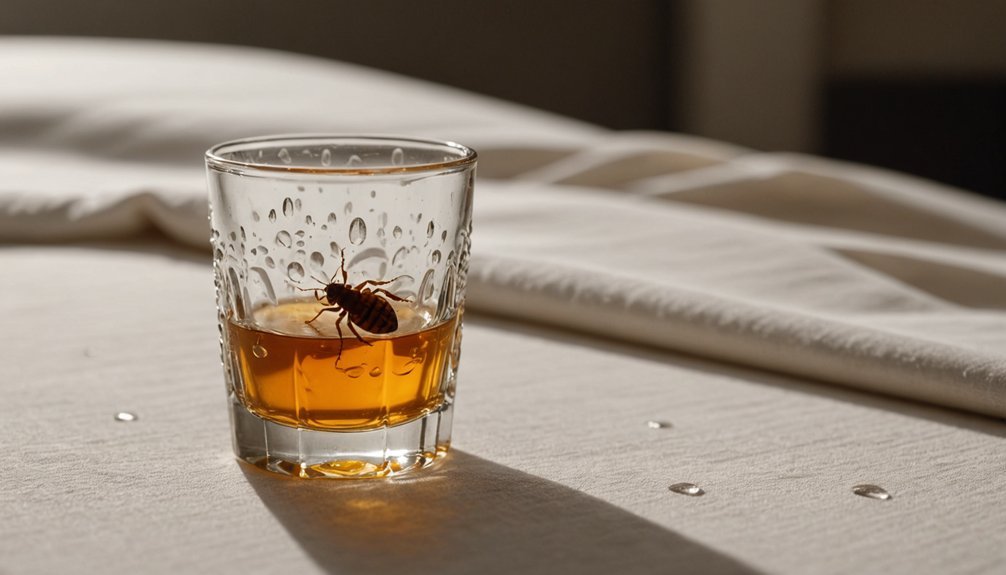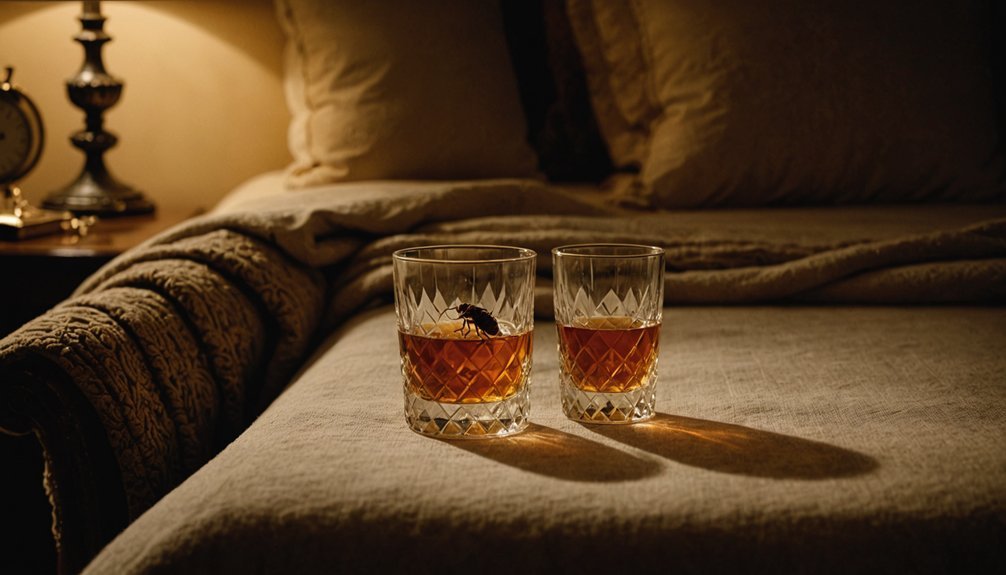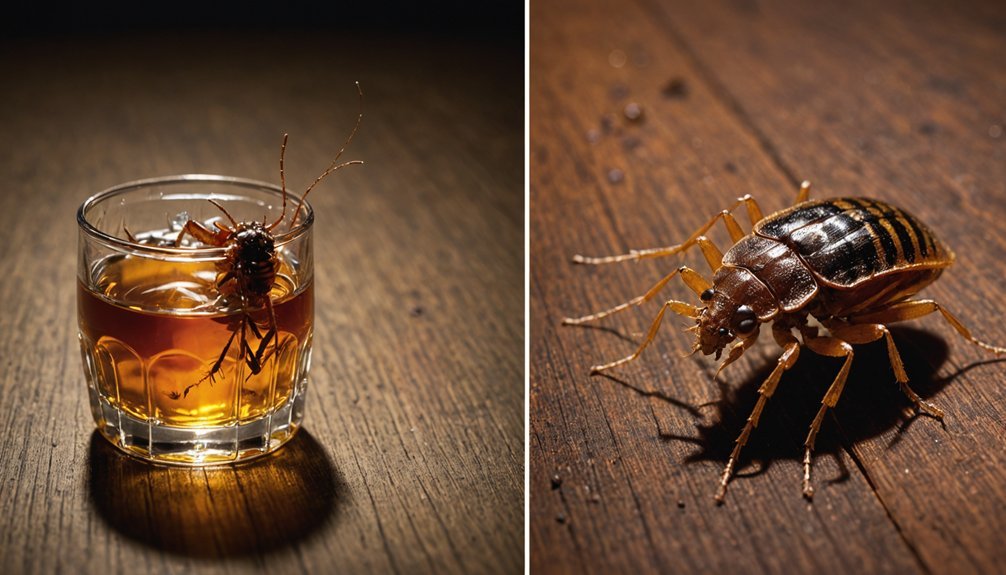Alcohol and Bed Bugs: Myth Vs Reality
If you’re struggling with bed bugs, you’ve probably heard that alcohol can kill them instantly. While there’s a grain of truth to this popular DIY solution, it’s not the miracle cure many believe it to be. Understanding the real science behind alcohol’s effect on bed bugs will help you avoid wasting time and money on ineffective treatments – and more importantly, prevent you from putting your home at risk with dangerous alcohol applications.
Key Takeaways
- While alcohol can kill bed bugs on direct contact, it’s ineffective against hidden bugs and eggs protected by shells.
- Bed bug females lay 73% fewer eggs when feeding on alcohol-tainted blood compared to pure blood.
- Neither 70% nor 91% isopropyl alcohol reliably kills bed bug eggs due to their protective coating.
- Spraying alcohol poses serious fire hazards and health risks, especially near mattresses or in poorly ventilated areas.
- Professional treatments offer 90%+ success rates, while alcohol’s effectiveness is limited by rapid evaporation and incomplete coverage.
The Science Behind Alcohol’s Effect on Bed Bugs

While many people wonder if drinking alcohol might deter bed bugs, scientific research reveals these pests actually modify their feeding behavior based on blood alcohol content.
They’ll consume less blood as alcohol concentrations increase, which directly impacts their survival and reproduction. When feeding on alcohol-tainted blood, females lay only 12 eggs compared to 44 eggs with pure blood. Bed bugs feeding on clean blood showed a mass increase of 100%.
Direct contact with isopropyl alcohol can kill bed bugs by dehydrating them, with 70-91% concentrations being most effective.
You’ll see higher mortality rates in adults compared to nymphs, but alcohol’s rapid evaporation limits its effectiveness. The bugs must be directly sprayed for the alcohol to work, making it an impractical solution since they often hide in hard-to-reach places.
Breaking Down Common Misconceptions

Despite alcohol’s known effects on bed bugs, numerous myths persist about its use as a treatment option.
You’ll find that alcohol isn’t the standalone solution many believe it to be. While it can kill bed bugs on direct contact, it won’t eliminate hidden pests or their eggs, which are protected by resilient shells.
Alcohol may kill visible bed bugs but fails to reach concealed insects or penetrate their protective egg casings.
Don’t be fooled by alcohol’s strong odor – it’s not an effective repellent once it evaporates. The most effective approach involves steam cleaning treatments that reach deep into cracks and crevices.
You’re also putting yourself at risk, as isopropyl alcohol is highly flammable and can cause respiratory irritation in enclosed spaces. It can even damage your furniture and mattresses.
Instead of relying on this ineffective DIY method, you’ll need a thorough approach.
Professional pest control services, combined with integrated pest management strategies, offer the most reliable path to bed bug elimination.
Real-World Effectiveness Across Life Stages

You’ll find that alcohol affects bed bugs differently depending on their life stage, with nymphs showing the highest vulnerability to direct contact.
While adult bed bugs demonstrate moderate mortality rates of up to 74% under heavy alcohol applications, they often survive lighter treatments and can escape to safety. Using 70% isopropyl alcohol provides the most reliable results when directly applied to visible bugs.
The most concerning aspect is that bed bug eggs remain largely unaffected by alcohol due to their protective coating, allowing infestations to persist even after treatment.
Nymphs Most Vulnerable Stage
Three key scientific findings demonstrate that bed bug nymphs are uniquely vulnerable to alcohol treatments compared to other life stages.
First, heavy alcohol sprays (70-100%) can kill up to 100% of nymphs within a week, while adults show only 15% mortality under identical conditions.
Second, nymphs’ softer exoskeletons make them especially susceptible to alcohol’s dehydrating effects, as their incomplete cuticle hardening leaves them vulnerable to moisture loss.
Third, direct spray application proves more effective than topical treatment, though reaching hidden nymphs remains challenging.
You’ll find alcohol’s effectiveness varies considerably based on application method and volume. Similar to issues faced along the Appalachian Byway, reaching hidden infestations in remote locations requires strategic planning.
While high-concentration sprays can be lethal to nymphs, you’ll need thorough saturation for meaningful results.
Remember that eggs remain resistant, with most still hatching post-treatment.
Eggs Resist Alcohol Treatment
While nymphs show vulnerability to alcohol treatments, bed bug eggs prove remarkably resilient, with 63-100% still hatching within three weeks regardless of alcohol concentration.
The protective egg chorion acts as a barrier, preventing alcohol from effectively penetrating and killing the embryos inside.
You’ll find that neither 70% nor 91% isopropyl alcohol concentrations reliably kill eggs, even when applied directly.
The rapid evaporation of alcohol limits its contact time with eggs, while their location in hard-to-reach cracks makes effective application nearly impossible.
Professional pest control experts recommend avoiding alcohol treatments since instant contact killing only affects visible bed bugs.
What’s more, you’re facing serious safety risks if you try to saturate eggs with alcohol, including fire hazards and dangerous vapor accumulation in enclosed spaces.
Since eggs continue hatching despite treatment, you can’t count on alcohol alone to break the bed bug life cycle.
Adults Show Limited Mortality
Adult bed bugs show remarkably limited mortality when exposed to alcohol treatments, with direct topical applications resulting in less than 15% mortality after 24 hours.
Even with heavy spray applications of 70% isopropyl alcohol, you’ll only achieve about 74% mortality in adult specimens. The alcohol’s effectiveness varies considerably based on application method and volume, with droplets often rolling off the bugs’ bodies during treatment.
- Direct spraying proves more effective than topical application, but requires heavy volumes for meaningful results
- Light to medium spray volumes only achieve 0-17% mortality in adults
- Mortality effects can develop slowly, with deaths occurring up to 7 days post-treatment
- Alcohol’s quick evaporation limits its contact time with bugs
- Adult bed bugs’ ability to avoid or shed the alcohol reduces real-world effectiveness
Safety Concerns and Household Risks
Despite its common use as a DIY bed bug treatment, alcohol poses serious safety risks that make it a dangerous choice for pest control.
When you spray alcohol in your home, you’re creating a significant fire hazard, especially around mattresses and furniture. The flammable vapors can easily ignite from electrical sparks, smoking, or cooking.
You’re also putting your health at risk through respiratory exposure and skin contact. Alcohol vapors can irritate your lungs, particularly in poorly ventilated bedrooms, and may worsen asthma symptoms.
The chemical can dry out and irritate your skin, while sleeping on treated surfaces increases your exposure. If you have children or pets, there’s added danger from accidental ingestion or contact.
These risks multiply when you combine alcohol with other household chemicals, potentially creating hazardous fumes.
Why Professional Treatment Matters
If you’re struggling with bed bugs, you’ll want professional pest control experts who use proven methods and specialized equipment to effectively eliminate these resilient pests.
Their trained eyes can spot hidden bugs in places you might miss, like deep wall cracks and furniture seams where DIY treatments often fail.
Professional treatments offer long-term solutions with success rates above 90%, backed by follow-up inspections to guarantee complete elimination of the infestation.
Proven Methods Work Best
Professional bed bug treatments consistently outperform DIY approaches, with success rates soaring above 90% when properly implemented.
Heat treatments are particularly effective, killing all life stages by maintaining temperatures above 113°F for 90 minutes. When you’re dealing with bed bugs, it’s vital to rely on proven methods that combine expertise, proper equipment, and integrated pest management strategies.
- Heat treatment penetrates deep into hiding spots, eliminating bugs resistant to chemicals
- Professional IPM approaches combine multiple methods, increasing effectiveness
- Experts can identify and target all life stages and concealed locations
- Professional services include necessary follow-up inspections and treatments
- Proper equipment and application techniques minimize risks while maximizing results
You’ll find that professional solutions offer thorough coverage and lasting results, making them more cost-effective than repeated DIY attempts.
Hidden Bugs Need Expertise
Because bed bugs excel at hiding in the tiniest cracks and crevices, finding them requires specialized tools and expertise that most homeowners don’t possess.
Professional pest control experts use specialized detection methods, including bed bug interceptors and canine scent detection, to locate these elusive pests in all their life stages.
You’ll need professionals to properly prepare your space before treatment. They’ll guide you through essential steps like decluttering, isolating furniture, and laundering items.
Their professional-grade treatments combine heat and chemicals to target all life stages effectively – from resistant eggs to adult bugs. They’ll raise room temperatures above 113°F for extended periods while applying appropriate chemical treatments in hard-to-reach areas.
Most importantly, they’ll monitor the situation post-treatment and perform follow-ups to guarantee complete elimination.
Long-Term Solutions Guaranteed
Investing in expert bed bug treatment pays off with proven, lasting results.
Professional pest control companies leverage specialized equipment, knowledge, and access to cutting-edge treatments that DIY methods can’t match. Their extensive approach combines heat treatments, chemical applications, and ongoing monitoring to guarantee complete eradication.
- Heat treatments achieve over 95% success rates when properly implemented, killing bugs and eggs in a single session.
- Professional monitoring helps identify resistance patterns and adjust treatment strategies accordingly.
- Licensed applicators follow strict safety protocols while using the most effective products available.
- Biopesticide innovations provide additional options for overcoming chemical resistance.
- Integrated pest management strategies, including post-treatment monitoring, prevent reinfestation and assure long-term success.
With professional expertise, you’ll get thorough treatment of all hiding spots and a customized plan that addresses your specific infestation challenges.
Smart Alternatives to Alcohol-Based Solutions
While alcohol-based solutions pose significant risks, several safer and more effective alternatives can help you tackle bed bug infestations.
You’ll find essential oils like tea tree, clove, and lemongrass offer natural repelling properties when applied consistently.
For a more thorough approach, try diatomaceous earth – a non-toxic powder that damages bed bugs’ exoskeletons, leading to their death.
Heat and freezing treatments can effectively kill bed bugs when properly executed, though you’ll need to monitor temperatures carefully to avoid damaging your belongings.
For best results, implement an integrated pest management strategy by combining these methods.
Apply diatomaceous earth in cracks and crevices, use essential oils as repellents, and consider professional pest control services for severe infestations.
Don’t forget to maintain regular inspections and thorough cleaning practices.
Conclusion
You’ll want to steer clear of using alcohol as your go-to bed bug solution. While it might seem like a quick fix, it’s ineffective and potentially dangerous. Instead, focus on proven methods and professional treatments that target all life stages of bed bugs. Don’t risk your safety with alcohol – reach out to pest control experts who can properly eliminate your bed bug problem.

